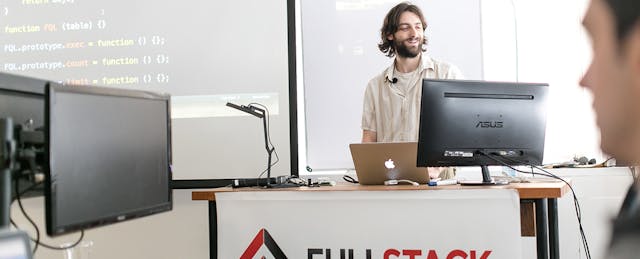San Luis Obispo, Calif., may be better known for its wineries and golden coastline than its tech economy. But that could change, thanks to a partnership between one of the major universities in the area, Cal Poly San Luis Obispo, and Fullstack Academy, a coding bootcamp based in New York and Chicago.
The two schools announced this week that Fullstack Academy will begin running 26-week coding bootcamps for the university’s continuing education school. The part-time course, called the the Cal Poly Coding Bootcamp, will be fully online and synchronous and taught remotely by Fullstack staff in New York. The program will initially focus on teaching full-stack JavaScript and students will earn a certificate from Cal Poly’s Extended Education school.
Cal Poly is the first university that Fullstack has partnered with, and the coding bootcamp plans to launch similar programs in the near future, according to Nick Grant, university program director for Fullstack.
The bootcamp recently hired two new employees to oversee the company’s effort to grow its partnerships with colleges and universities. Those new employees will be “going to universities and speaking to them about the Cal Poly program, looking for other, smaller communities where this could fill some kind of [tech skills training] gap,” Grant explains.
Fullstack isn’t the first company to try to bring coding bootcamps to universities. There’s also Trilogy Education Services, which helps colleges and universities create and run bootcamp-like training programs via university extension programs. And other coding bootcamps, like Flatiron and Kenzie Academy, have launched short-term tech programs on college campuses.
Like Trilogy, which tailors its partnerships to local employer and industry hiring needs, the Full Stack partnership aims to fill tech employment gaps in the San Luis Obispo region. Grant is currently based in San Luis Obispo and says a large part of his job these days is getting the word out to the community about the new course.
“We're really trying to expose this audience,” says Grant. “It’s different than a place with a big tech hub already. It's really showing what the potential is and trying to find the right individuals.”
Because the coding program is fully online, Fullstack and Cal Poly are focusing their attention outside of the California coast, too. “Our marketing efforts are targeted primarily to our alumni and community members to meet their needs and career goals,” Dan Weeks, chairman of the Cal Poly Computer Science and Software Engineering Industrial Advisory Board, said in an email.
Fullstack will oversee the day-to-day operations of the course, including instruction, and officials at Cal Poly’s Extended Education program sign off on the curriculum.
The two institutions also share revenue for students who come through the program, which costs $11,910 (Fullstack’s full-time program is $17,910).
In addition to revenue, Fullstack also has access to Cal Poly’s name and brand. “It also gives us a nod of credibility because Fullstack is an unknown entity coming into this market,” says Grant.
No prior experience is required to enroll in Cal Poly Coding Bootcamp, but there is an extensive application process. First, there is a traditional application for information on work and academic background. Second, applicants take a logic and reasoning test (according to Grant, the test is “not as tough” as the test to get in Fullstack’s more selective full-time programs). The third component is a phone interview that includes questions “to gauge how they react to situations when you have to learn new concepts or frameworks,” says Grant.
Students in the program will have access to Fullstack instructors, teaching fellows and career counselors at the bootcamp.
The size of the first cohort has yet to be determined but Grant says expect between 25 and 40 people, with the goal of running three to four cohorts per year. The course will launch on April 2.


